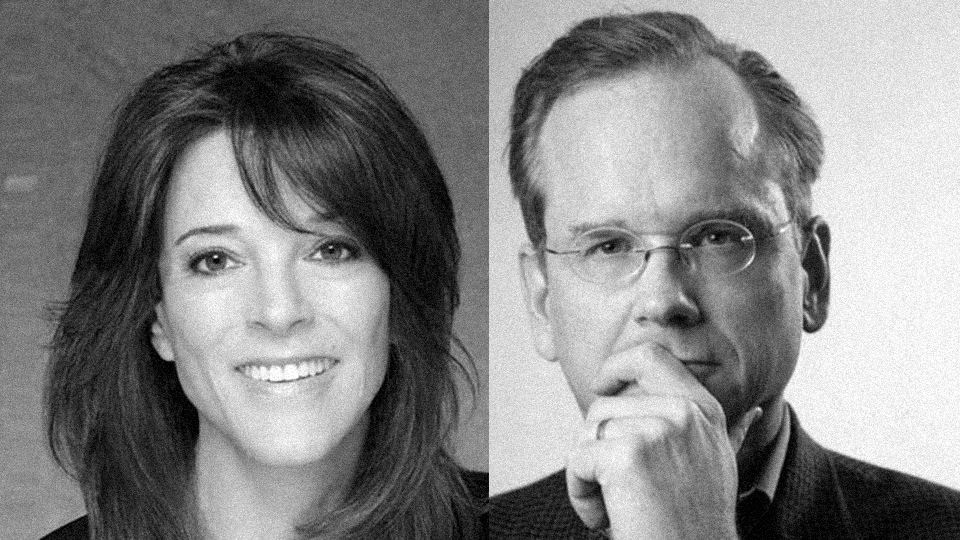On Thursday, June 4, two of the nation’s leading voices against political corruption will be joining Occupy.com in a call for citizen action leading up to the 2016 presidential primaries.
Harvard law professor Lawrence Lessig, along with bestselling author Marianne Williamson, will be speaking at Town Hall in Seattle, Wash., following a screening of the documentary “Killswitch,” about the fight against privatization of the Internet. Both Williamson and Lessig will call on participants to organize in their communities to end the domination of the electoral system by the wealthy.
Williamson, a spiritual guru who has published 10 books, four of which have topped the New York Times bestseller list, has recently taken on the cause of fighting the corruption of big money in elections. A former Congressional candidate in southern California, Williamson ran as an independent in a heavily-Democratic district in 2014.
“I believe that a wave of independent candidates, all committed to a huge course-correction, is necessary to turn our ship around,” Williamson said in her campaign announcement. She ultimately placed fourth.
Lessig helped launch the New Hampshire Rebellion (NHR), a burgeoning activist group with over 13,000 supporters nationwide, and wants the NHR to set the standard for grassroots direct action in presidential primaries around the nation.
NHR director Jeff McLean said the group’s main function is to confront candidates at the highly-influential 2016 New Hampshire primary about how they plan to address the corrupting influence of big money in politics.
“We’ve done polling that shows that 96% of the public thinks big money has corrupted politics, yet 91% thinks nothing can be done about it,” McLean told Occupy.com. “Whatever your issue is, it’s fundamentally being blocked by this issue – and that ranges from the left to the right, from tax reform to educational reform or climate change.”
McLean is not exaggerating. According to Lessig’s research, members of the U.S. Senate spend between 30 to 70 percent of their time raising money for their next re-election campaign, with the percentages trending higher as their re-election draws closer.
As I recently reported in the Guardian, campaign accounts of U.S. Senators who voted “yea” on fast-tracking the Trans-Pacific Partnership received substantial amounts of money from pro-TPP corporations during the months that the Senate was debating the TPP. The “yea” votes who have re-election races in 2016 had considerably higher contribution amounts.
The NHR’s strategy to confront presidential candidates in the New Hampshire primary over the corruption of big money has been building awareness since the group’s first organized march across New Hampshire during January of 2014, when over 100 marchers walked from the far-northern hamlet of Dixville Notch, where New Hampshire’s first primary ballots are cast, all the way to Nashua, which borders Massachusetts.
In Summer of 2014, Lessig and the NHR marched through all 16 miles of New Hampshire’s coastline, from Hampton Beach to Portsmouth. A NHR walk in January of 2015 attracted nearly 500 marchers, in which four simultaneous walks from Dixville Notch, Portsmouth, Nashua, and Keene, bordering Vermont, all converged at the New Hampshire state capitol in Concord. The NHR recently finished a walk last Saturday, the same day as the global March Against Monsanto.
“The mainstream debate is shifting. You’ve got the gyrocopter incident. You’ve got people standing up in the Supreme Court demanding that the issue be addressed. You’ve got [Bernie] Sanders talking about the issue and other candidates talking about it in New Hampshire,” McLean said.
“Real New Hampshire voters are turning their focus to this. New Hampshire is primed to this because we always have been – [John] McCain won here in 2000 largely because he talked about the system of corruption.”
NHR has armed their supporters with the technology to make their confrontations with candidates spread instantly online. Through the site questionr.us, users can download an app to their phones, and people asking candidates what specific reforms they propose to address the problem of big money controlling politics can upload videos of their interactions directly to the site.
McLean stressed that the movement against corruption is cross-partisan, and focuses on candidates from both parties.
“This is not a partisan issue, and we can’t fix this by it being partisan,” McLean told Occupy.com. “When politicians are more partisan, they tend to raise more money, and that’s wrong.”
While some anti-corruption groups like Move to Amend and WolfPAC have specific strategies for achieving an end to the corruption of money in politics – like a constitutional amendment or an Article V convention – McLean said the NHR’s mission is to simply elect a president who campaigns on fixing the broken campaign finance system.
“We are not recommending certain legislation, but certainly there are very good ideas out there – tax credits, vouchers, free and reduced airtime, Article V,” McLean said. “But we want to make sure that the president who is inaugurated on Jan. 20, 2017, makes this issue the first and addresses it on Day 1.”
Lessig and Williamson will be speaking at Seattle’s Town Hall on Thursday, June 4, after the 7pm screening of “Killswitch”.
3 WAYS TO SHOW YOUR SUPPORT
- Log in to post comments












